Australian Pain Society NEWSLETTER







We have a fantastic edition for our members this month. Like many of us, I like to plan ahead for what to go, see and do next year in relation to pain events and meetings. Check out the calendar of events and start filling in your diary for next year and planning to have some time off. Keep an eye out for the release of the new program for next years ASM 10th-13th April 2022, in Hobart. Registrations will open on the 16th of November.
Did you miss any of the live sessions in APS 2021 ASM? Want to revisit some of the cracking good sessions or just re-watch your favorite session? On demand recordings are still available in the APS 2021 portal.
We also have added to our quick links (FYI) page a hyperlink to the pelvic pain education program, this is a great interactive site with lots of resources.
Check out the exciting opportunities in the BPR pain hour, their next session is devoted to the experiences of early career researchers working in the US. Both Dr Kelly Smith and Dr Mark Gradwell will not only present their latest findings on itch, touch and pain but also provide firsthand insights into what it is like to move overseas and continue in their research careers.
A friendly reminder for you all to please send the APS newsletter editorial team a short commentary or abstract from your latest article for publication. Our members are keen to hear about what their colleagues are up to and to be able to keep up to date with the latest research.
Until next time
Dr Joanne Harmon
We are excited at the prospect of finally getting together again for our first face to face meeting in 3 years and are thrilled to finally be able to host it in Hobart.
Here are a few things to look forward to in November:
Program Released, including Pre-Conference Workshops
Registration Opens: 16 November 2021
Complete the Expression of Interest form to be kept up to date with conference news as it becomes available.
Should you have any queries about the conference, please contact the Conference Secretariat
The APS’s Pre-Conference Workshop Day provides delegates with a flexible approach when it comes to choosing what they attend. All workshops are offered as half days, giving delegates the opportunity to personalise their own learning.
Customise your conference experience by attending the Acute Pain Workshop in the morning, before heading over to the Pharmacology in Pain Management afternoon session.
APS Members who attend the conference are rewarded with more competitive workshop registration fees, so start planning your week in Hobart today by becoming an APS Member and joining us at the only conference in Australia offering multidisciplinary insights into the complex nature of pain management from a variety of medical, nursing and allied health perspectives.
Date: Sunday 10 April 2022
Venue: Hotel Grand Chancellor, Hobart
Website: http://www.dcconferences.com.au/aps2022/pre-conference_workshops
A multi-disciplinary workshop designed to suit all knowledge levels. The basics for those new to the practice of Acute Pain will be addressed. New information and research, with a focus on understanding the role of allied health, and providing practical advice will also be presented.
Workshop proudly sponsored by:
The Fundamentals of Pain pre-conference workshop is a succinct overview of the physiology, clinical assessment, and clinical management of pain.
The workshop is aimed at the general practitioner, specialist, allied health clinician or psychologist looking for an introduction to, or update on, persistent pain management.
This workshop is grounded in a biopsychosocial understanding of pain mechanisms and developing a mechanism-based approach to pain assessment and management.
This workshop will compliment those with an interest in attending an afternoon session of pharmacology, acute pain or physiotherapy topics.
This workshop will showcase the latest in Australian basic pain research from early career and senior researchers, and provide a forum to discuss mechanisms of nociception and pain across all levels of investigation: from molecular and cellular analyses, to studies in animals and humans (pre-clinical or clinical).
This workshop is open to all interested in mechanisms of nociception and pain, including basic and clinical researchers, health professionals and students at all levels.
The intended audience includes GPs, Pharmacists, Specialists and other Allied Health professionals with interest in pharmacology and its application in persistent pain within the clinical setting.
In line with the IASP Global year of translating knowledge into practice, this interactive workshop will focus on the evidence-based learnings of nociplastic pain conditions. It will explore, pharmacological, complementary medicines and the possible correlations of the gut microbiome in chronic pain conditions. We’ll also explore the evidence of placebo response and techniques and its influential role in each of our interactions with patients having a magnifying (or inhibiting) the powerful medication we dispense.
Inter-disciplinary pain management has been the “gold standard” approach for decades. When it works, it is tremendous! But, there are many challenges applying this in practice. From interpersonal difficulties to systemic regulations, achieving strong communication and a united team approach can be hard to achieve.
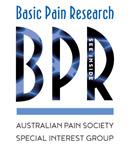
This workshop will look at the benefits and challenges of inter-disciplinary pain management.
Attendees will leave this workshop stimulated as to how they could improve this care in their own work setting.
The workshop will include a case study for practical application of principles that will be addressed by the various expert speakers. There will be opportunities for questions and networking with peers, so that current evidence-based knowledge can be optimised and translated in everyday practice.
Workshop proudly sponsored by:
The Australian Pain Society (APS) is pleased to announce the availability of several Travel Grants for members to present their research at our Annual Scientific Meeting (ASM).
Travel Grants are awarded as follows:
• PhD students: up to the value of $500
• A single dedicated Travel Grant of $500 for a Pain in Childhood (PinC) SIG member
• A single dedicated Travel Grant of $500 for a Basic Pain Research (BPR) SIG member
• If funds permit, further travel grants may be offered to nurses, allied health professionals (AHP), and other post-graduate students.
This Travel Grant program is designed to encourage contribution to and participation in the ASM and is made possible through an allocation of a capped pool of APS operating funds.
Full eligibility criteria and Terms and Conditions are available on the Travel Grants webpage.
To be considered for a Travel Grant:
a. an EOI for a Travel Grant must be indicated when your abstract is submitted; AND
b. a Travel Grant Application form must be submitted to aps@apsoc.org.au by 5pm on 30 November 2021 – no exceptions.
You are invited to attend the Acute Pain Day Pre-Conference Workshop
A multi-disciplinary workshop designed to suit all knowledge levels. The basics for those new to the practice of Acute Pain will be addressed. New information and research, with a focus on understanding the role of allied health, and providing practical advice will also be presented.
When: Sunday 10 April 2022, 8.30 am – 5.00 pm
Where: Hotel Grand Chancellor, Hobart
Cost: Start from $160 (Full Day) per person – Early Bird Registration Deadline: 28 Feb 2022
To register or for further information please visit, www.dcconferences.com.au/aps2022/pre-conference_workshops
You are invited to attend the
The Fundamentals of Pain pre-conference workshop is a succinct overview of the physiology, clinical assessment, and clinical management of pain.
The workshop is aimed at the general practitioner, specialist, allied health clinician or psychologist looking for an introduction to, or update on, persistent pain management.
This workshop is grounded in a biopsychosocial understanding of pain mechanisms and developing a mechanism-based approach to pain assessment and management.
This workshop will compliment those with an interest in attending an afternoon session of pharmacology, acute pain or physiotherapy topics.
When: Sunday 10 April 2022, 8.30 am – 12.30 pm
Where: Hotel Grand Chancellor, Hobart
Cost: Start from $110 per person – Early Bird Registration Deadline: 28 Feb 2022
To register or for further information please visit, www.dcconferences.com.au/aps2022/pre-conference_workshops
You are invited to attend the
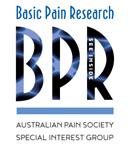
This workshop will showcase the latest in Australian basic pain research from early career and senior researchers, and provide a forum to discuss mechanisms of nociception and pain across all levels of investigation: from molecular and cellular analyses, to studies in animals and humans (pre-clinical or clinical).
This workshop is open to all interested in mechanisms of nociception and pain, including basic and clinical researchers, health professionals and students at all levels.
When: Sunday 10 April 2022, 8.30 am – 12.30 pm
Where: Hotel Grand Chancellor, Hobart
Cost: Start from $110 per person – Early Bird Registration Deadline: 28 Feb 2022
To register or for further information please visit, www.dcconferences.com.au/aps2022/pre-conference_workshops
Inter-disciplinary pain management has been the “gold standard” approach for decades. When it works, it is tremendous! But, there are many challenges applying this in practice. From interpersonal difficulties to systemic regulations, achieving strong communication and a united team approach can be hard to achieve.
This workshop will look at the benefits and challenges of inter-disciplinary pain management. Attendees will leave this workshop stimulated as to how they could improve this care in their own work setting.
When: Sunday 10 April 2022, 1.30 pm – 5.00 pm
Where: Hotel Grand Chancellor, Hobart
Cost: Start from $110 per person – Early Bird Registration Deadline: 28 Feb 2022
To register or for further information please visit, www.dcconferences.com.au/aps2022/pre-conference_workshops
You are invited to attend the PHARMACOLOGY
Translating current evidence in the management of nociplastic pain conditions into clinical practice
The intended audience includes GPs, Pharmacists, Specialists and other Allied Health professionals with interest in pharmacology and its application in persistent pain within the clinical setting.
In line with the IASP Global year of translating knowledge into practice, this interactive workshop will focus on the evidence-based learnings of nociplastic pain conditions. It will explore, pharmacological, complementary medicines and the possible correlations of the gut microbiome in chronic pain conditions. We’ll also explore the evidence of placebo response and techniques and its influential role in each of our interactions with patients having a magnifying (or inhibiting) the powerful medication we dispense.
The workshop will include a case study for practical application of principles that will be addressed by the various expert speakers. There will be opportunities for questions and networking with peers, so that current evidence-based knowledge can be optimised and translated in everyday practice.
When: Sunday 10 April 2022, 1.30 pm – 5.00 pm
Where: Hotel Grand Chancellor, Hobart
Cost: Start from $110 per person – Early Bird Registration Deadline: 28 Feb 2022
To register or for further information please visit, www.dcconferences.com.au/aps2022/pre-conference_workshops
Get in early and secure your place at Australia’s only multidisciplinary conference offering insights into the complex nature of pain management from a variety of medical, nursing, and allied health perspectives.
Complete the Expression of Interest form to be kept up to date with conference news as it becomes available.
Be a member and save on your APS 2022 registration fee!
Early Bird
Before 28 February 2022
Non-Member Registration Price VS
Becoming an APS Member
APS Student Member Registration Price
$1,140
OR
Being a member saves you up to $270 after membership fees!
Only $230
Being a member saves you $845 after membership fees!
Tell your colleagues who are interested in becoming members so they can save on their registrations too!
Become an APS Member and start saving straight away!
We look forward to welcoming you to Hobart, Tasmania.
Should you have any queries about the conference, please contact the Conference Secretariat
Did you miss any live sessions from the last APS Conference and webinar series?
Or do you just want to re-watch your favorite sessions?
On demand recordings are still available in the APS 2021 Portal. Take this opportunity to access all session recordings and poster presentations as they will only be available until April 2022.
For any assistance in accessing the portal or other information please contact APS Conference Secretariat: aps2022@dcconferences.com.au
Thank you to APS members Felicity Braithwaite, Erica Wilkinson, Tasha Stanton, Lorimer Moseley AO and their colleague Valeria Bellan, for sharing the following recent publication.
Article first published online: August 20, 2021
Journal Reference: Bellan, V, Braithwaite, FA, Wilkinson, EM, Stanton, TR & Moseley, GL 2021, ‘Where is my arm? Investigating the link between complex regional pain syndrome and poor localisation of the affected limb’, PeerJ, vol. 9, no. e11882.
DOI: 10.7717/peerj.11882
Link: https://pubmed.ncbi.nlm.nih.gov/34484984/
Anecdotally, people living with Complex Regional Pain Syndrome (CRPS) often report difficulties in localising their own affected limb when it is out of view. Experimental attempts to investigate this report have used explicit tasks and yielded varied results.
Here we used a limb localisation task that interrogates implicit mechanisms because we first induce a compelling illusion called the Disappearing Hand Trick (DHT). In the DHT, participants judge their hands to be close together when, in fact, they are far apart. Sixteen volunteers with unilateral upper limb CRPS (mean age 39 ± 12 years, four males), 15 volunteers with nonCRPS persistent hand pain (‘pain controls’; mean age 58 ± 13 years, two males) and 29 pain-free volunteers (‘pain-free controls’; mean age 36 ± 19 years, 10 males) performed a hand-localisation task after each of three conditions: the DHT illusion and two control conditions in which no illusion was performed. The conditions were repeated twice (one for each hand). We hypothesised that (1) participants with CRPS would perform worse at hand self-localisation than both the control samples; (2) participants with non-CRPS persistent hand pain would perform worse than pain-free controls; (3) participants in both persistent pain groups would perform worse with their affected hand than with their unaffected hand.
Our first two hypotheses were not supported. Our third hypothesis was supported —when visually and proprioceptively encoded positions of the hands were incongruent (i.e. after the DHT), relocalisation performance was worse with the affected hand than it was with the unaffected hand. The similar results in hand localisation in the control and pain groups might suggest that, when implicit processes are required, people with CRPS’ ability to localise their limb is preserved.
Contrary to our hypotheses, being in pain does not seem to necessarily lead to worse self-localisation abilities. However, possibly due to use-dependent effects, people tend to perform better with the unaffected hand compared to the affected counterpart. Future studies will need to clarify whether this disadvantage of the affected hand is body-centered or body part-centered. Interestingly, the similar performance in localisation abilities of people with CRPS and pain-free controls led to the interpretation of a possible dissociation between implicit and explicit neural processes in CRPS. This would once again suggest the existence of neglect-like characteristics in CRPS.
G. Lorimer Moseley is an Academic Editor for PeerJ. He has been reimbursed by professional and scientific bodies for travel costs related to presentation of research on pain at scientific conferences/symposia, and has received support from: Reality Health, Connect Health UK, Seqirus, Kaiser Permanente, Workers’ Compensation Boards in Australia, Europe and North America, AIA Australia, the International Olympic Committee, Port Adelaide Football Club, Arsenal Football Club. G. Lorimer Moseley has also received speaker fees for lectures on pain and rehabilitation, and receives book royalties from NOI group (Neuro Orthopeadic Institute) publications, Dancing Giraffe Press & OPTP for books on pain and rehabilitation. Tasha R. Stanton has received speaker fees related to presentations on pain and rehabilitation.
Thank you to APS members Hayley Leake, Lorimer Moseley AO, Tasha Stanton, Edel O’Hagan and their colleague Lauren Heathcote, for sharing the following recent publication.
Article first published online: February 18, 2021
Journal Reference: Leake HB, Moseley GL, Stanton TR, O’Hagan ET, Heathcote LC. What do patients value learning about pain? A mixed-methods survey on the relevance of target concepts after pain science education. Pain. 2021;162(10):2558-2568.
DOI: 10.1097/j.pain.0000000000002244
Link: https://pubmed.ncbi.nlm.nih.gov/33960326/
Introduction
Pain education is a popular treatment approach for persistent pain. It involves learning a variety of concepts about pain (i.e. target concepts), which is thought to be an important part of recovery. Yet, little is known about what patients value learning about pain. The aim of this study was to investigate which target concepts are important to people who self-identify as improved after a pain science education intervention for persistent pain, and why.
This study used a convergent mixed-methods approach, whereby 2 types of data (qualitative and quantitative) were collected and analysed independently, and then integrated for interpretation.
An online survey was distributed to 123 people who were treated for persistent pain with a pain science education approach; responses of participants who selfidentified as “improved” were analysed. Open-ended survey questions were analysed using reflexive thematic analysis and close-ended questions were analysed for frequency of responses. Each question-type was analysed separately before integration for complementarity.
The survey was responded to by 119 participants (96.8% response rate). We analysed the data of 97 participants. We constructed 3 themes from the open-ended questions. Pain does not mean my body is damaged (theme 1) captured the importance of abandoning pre-existing ideas that pain indicated damage. Thoughts, emotions and experiences affect pain (theme 2) captured the value of recognising multifactorial influences on pain. I can retrain my overprotective pain system (theme 3) captured the importance of conceptualising pain as a heightened protective response that could be lessened. Responses from close-ended questions confirmed that the target concepts represented by these themes are among those most valued, although divergence with the qualitative data suggests differences between patient and clinician language.
These data offer patient-centred conceptualizations and language that could assist in further refining pain education interventions.
Declaration
G.L. Moseley receives royalties for pain education related books and fees for lectures on pain. The remaining authors have no conflicts of interest to declare.
Have you had an article accepted for publication this year?
The Australian Pain Society (APS) is keen to share publications from our members with their colleagues via our eNewsletter. If you’ve had an article accepted or published recently, please contact our Assistant Editor Joanne Harmon via the APS Secretariat (aps@apsoc.org.au) with the title, authors, and reference (i.e., journal, volume, and DOI) of your article and request the submission template. We would love it if you also supply a short commentary (300 words max) to give our readers the gist of the article.

We are calling for expressions of interest from APS members to contribute to our submission.
If you would like to be involved, please contact the APS Secretariat and request a Word version template to be completed and returned to the APS Secretariat by 30 November 2021.
We look forward to being able to include feedback directly from our membership for this important Royal Commission submission.
The Faculty of Pain Medicine (FPM) PS12(PM) Position statement on the use of ketamine in the management of chronic non-cancer pain (CNCP) reflects both the unsettled state of the literature in this arena and the fact that such practice is “off- label” in Australia and New Zealand. This document is not a guideline for the use of ketamine in CNCP but offers guidance, based on the literature and expert consensus, in order to inform the judgement of practitioners and to promote safety and quality for their patients.
The PS12(PM) background document can also be found online.
This position statement is being piloted and will be reviewed again in December 2021.
The FPM welcomes your feedback during this time, please contact Penny McMorran, Professional Affairs Co-ordinator, via email fpm@anzca.edu.au.

The NSW Agency for Clinical Innovation (ACI) together with icare NSW, are proud to announce new online resources are available for health professionals and clinicians treating clients or patients with chronic pain, particularly those who’ve sustained a brain injury.
Chronic Pain can be managed using the simple tools on the chronic pain and brain injury website, which address pain, fatigue, sleep, depression, anxiety and physical activity.
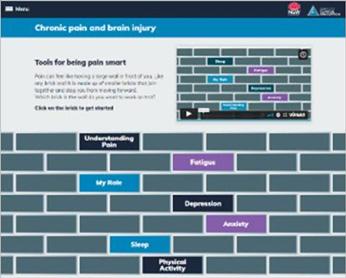
Click here to view a short video.
Chronic pain can be managed when clinicians and their patients or clients use the simple tools on the Chronic pain and brain injury website, that address pain, fatigue, sleep, depression, anxiety and physical activity.
BE
NEW WEB BASED TOOLS FOR PEOPLE WHO HAVE PAIN AND A BRAIN INJURY
Media Release: 14 October 2021
The Australian Government is investing up to $30 million in health and medical research to help bring ground-breaking discoveries to fruition.
The Morrison Government is investing up to $30 million in health and medical research to help bring ground-breaking discoveries to fruition.
Through the Medical Research Future Fund, our government will open two new grant opportunities across key areas of medical research.

Firstly, a new grant opportunity will open targeted at Chronic Musculoskeletal Conditions in Children and Adolescents, with funding up to $20 million over four years from 2021-2022.
An estimated 880,000 musculoskeletal problems in children and adolescents are managed in primary care in Australia each year.
Musculoskeletal conditions that affect children and adolescents include juvenile idiopathic arthritis, juvenile systemic lupus erythematosus, back and hip conditions, muscular dystrophies and musculoskeletal pain.
The intended outcome of this grant opportunity is to improve the health care for children and adolescents with chronic musculoskeletal conditions by developing superior diagnostic approaches and by building evidence for best treatment approaches, including improved therapeutic regimes and validated models of care.
Secondly, a grant opportunity will open to help researchers develop and implement new approaches for improving patient care and health outcomes through better use of health information.
The Research Data Infrastructure grant opportunity provides up to $10 million for projects that bring together information held in different systems or platforms or that use novel methods like artificial intelligence to answer important health questions.
Better use of data will help to enable earlier diagnosis and increase the effectiveness of treatments and improve health outcomes.
It will also help reduce the probability of adverse reactions, better prevent diseases by identifying risk factors, and improve the monitoring of the effects of medical drugs.
These grants will continue to help our worldleading health and medical researchers build evidence to develop superior diagnostic approaches, and best treatment approaches, including improved therapeutic regimes and models of care.
Health and medical research remains our best hope to improve health outcomes for all Australians. It saves lives and improves lives.
The $20 billion Medical Research Future Fund (MRFF) supports Australia’s world class health and medical researchers by investing in innovative and game changing discoveries for the health of all Australians.
To apply for these grants please visit the GrantConnect website
The Australian Pain Society (APS) is a multidisciplinary association whose mission is to advance pain prevention, management and clinical practice. Our vision is that all people will have optimal access to pain prevention and management throughout their life.
The Australian Pain Relief Association (APRA) is a registered charity with the Australian Taxation Office and works closely with the APS to support education and research in pain.
Cops for Kids (CFK) is a South Australian based charity focused on supporting initiatives that strive to improve the lives of children in that state. Part of the CFK mandate includes the provision of funds for research to assist in the care of sick children and/or enhance the life quality of a child.

APS is pleased to announce our partnership with Cops For Kids, for the fifth Clinical Research Grant Program
In brief, the award is to enable clinical research meeting the following criteria:
• Approach a meaningful conclusion in one year
• Conducted in Australia and must be relevant to the South Australian population
• The applicant must be an Australian citizen or permanent resident
• The applicant and their supervisor (if
applicable) must be members of the Australian Pain Society and its Pain in Childhood Special Interest Group
• The funded project can be related to any aspect of a childhood pain complaintincluding theoretical, mechanistic, diagnostic, treatment, epidemiological and/or sociological approaches; and
• The grant funding (inclusive of GST) will be paid quarterly in arrears upon the submission and acceptance of a combined Progress Report-Acquittal Form
Further information about the Clinical Research Grant can be obtained from the APS Secretariat.
Clinical Research Grant Application forms are available online and must be submitted by:
5pm on Tuesday 14 December 2021.

7 December 2021 at 1-2pm AEDT via Zoom
The mission of our Basic Pain Research Special Interest Group (BPR SIG) is to share, improve and promote scientific knowledge and understanding of the mechanisms of nociception and pain across all levels of investigation: from molecular and cellular analyses, to pre-clinical or clinical studies. This forum will provide an informal platform to promote and share our research and insights, from early career researchers (ECRs), including students and senior colleagues.
Summary: This Pain Hour will welcome presentations from two Australian ECRs currently working in the United States. Both speakers, Dr Kelly Smith and Dr Mark Gradwell, completed successful PhDs in Australia at the University of Newcastle, dissecting spinal pain processing circuits and revealing novel amplifier and sensory gating networks in this region. Both have also continued to study the complex issue of how the spinal cord contributes to our sensory experience in their overseas postdoctoral positions. Dr Kelly Smith moved to work with Sarah Ross at the University of Pittsburgh, taking a particular focus on how itch and pain signalling are differentiated by spinal circuits. Kelly will speak to
‘The delta opioid receptor bidirectionally modulates itch’. Dr Mark Gradwell moved to work with Victoria Abriara at Rutgers University, where her lab focusses on the sense of touch and how this modality can be exploited to improve recovery from spinal cord injury. Mark will present on ‘Cracking the Code: Identifying the spinal neurons behind somatosensation’. Both will use their presentations to describe their recent findings on itch, touch, and pain; while also providing firsthand insight into the rewards and challenges of moving overseas as an ECR to continue their research careers.
The invited speakers:
• Dr Kelly Smith, Centre for Neuroscience, University of Pittsburgh
• Dr Mark Gradwell, Department of Cell Biology & Neuroscience, Rutgers University
All are welcome to attend, including postgraduate students.
We look forward to seeing you there, please register here
The Faculty of Pain Medicine (FPM) has generously extended to all APS members a purchase discount of 20% for the “Better Pain Management” modules and courses. Purchase any quantity of Better Pain Management modules or courses in ONE transaction and receive the 20% APS member discount on the entire transaction (no further discounts apply).
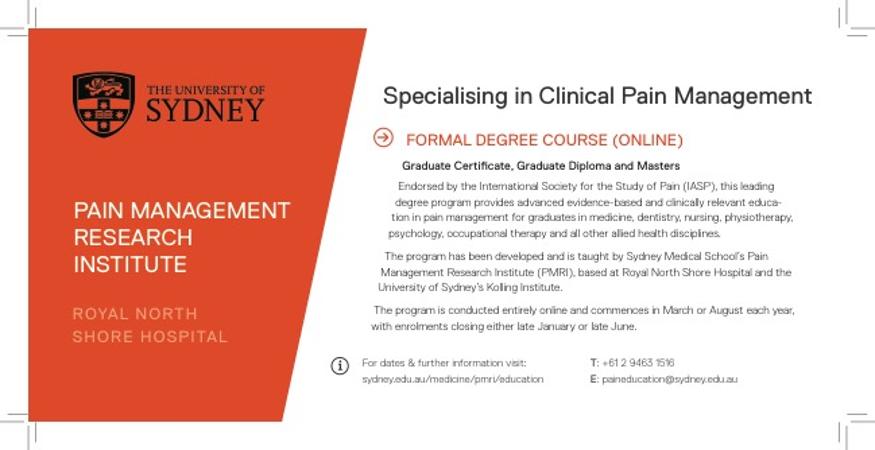
This discount gives you the flexibility to “Pick’n’Mix” your preferred topics for self-directed and self-paced e-learning.
The 20% discount can be applied to:
• Any single module purchases
• 3-module pre-packaged courses or ‘select your own’ 3 module pack
• 6-module pre-packaged courses or ‘select your own’ 6 module pack
• 12-module complete BPM course
To enrol in any course and take advantage of this discount, please Contact BPM and nominate your module or course selections. BPM will provide a unique APS voucher code for the 20% APS member discount on your purchase.

We are pleased to welcome you to the 13th International Symposium on Pediatric Pain, to be held as a virtual event from Thursday 24th to Sunday 27th March, 2022.
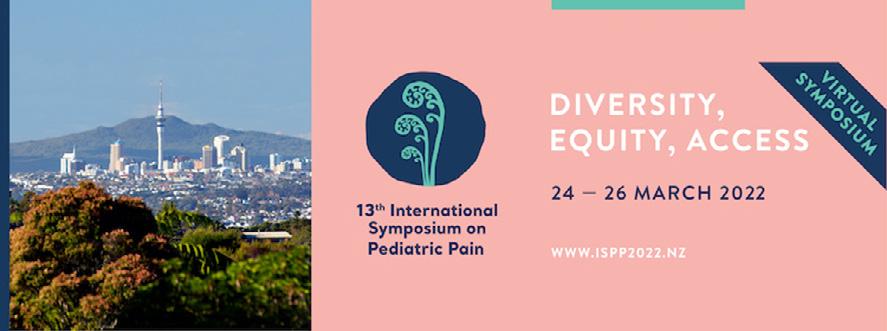
The welcome to join us for ISPP 2022 remains an awhi mahana nui (big warm hug). The invited speakers are confirmed and ready to engage, inform and wow us all.
It is with põuri (sadness), that due to the worldwide disruption caused by the COVID-19 pandemic, we must announce that the Symposium from Friday 25th to Sunday 27th March 2022 will now be a fully virtual event. This means that both delegate attendance and speaker presentations will be delivered on our virtual platform.
The Education Day on Thursday 24th March will remain a hybrid meeting at The Cordis Hotel, Auckland. Attendance on this day can be virtual or in-person (for people living in New Zealand). Education Day presentations may be virtual - via live-stream or pre-recorded - or in-person. Our Education Day will be held alongside the New Zealand Pain Society Conference at The Cordis Hotel.
Registration is Now Open at www.ispp2022.nz
Our Scientific Committee would like to introduce our keynote speaker, Professor Clifford J. Woolf.

Register now for the 13th International Symposium on Pediatric Pain 2022, to see Professor Woolf in action!
CLIFFORD WOOLF was born in South Africa, where he earned his MB, BCh, and Ph.D. degrees. He moved to London in 1979 and became Professor of Neurobiology at University College London, then in 1997, he moved to the Massachusetts General Hospital and Harvard Medical School. In 2010 he was named director of the F. M. Kirby Neurobiology Center at Boston Children’s Hospital and became Professor of Neurology and Neurobiology at Harvard Medical School. He has published over 300 research papers on molecular, cellular, and systems neurobiology, with a particular focus on pain, regeneration, and neurodegeneration, has more than 30 issued patents and has founded several companies, and is a fellow of the American Academy of Arts and Sciences. He was awarded a Doctoris Honoris Causa from the University of Lausanne, Switzerland in 2020, received a Gill Distinguished Scientist award and the Reeve-Irvine medal in 2017, and in 2015, the Kerr award. Dr. Woolf is currently a member of the NIH HEAL Partnership Committee which assists with the development of new treatments for pain and addiction.

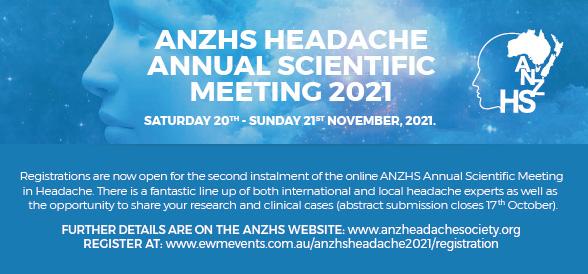




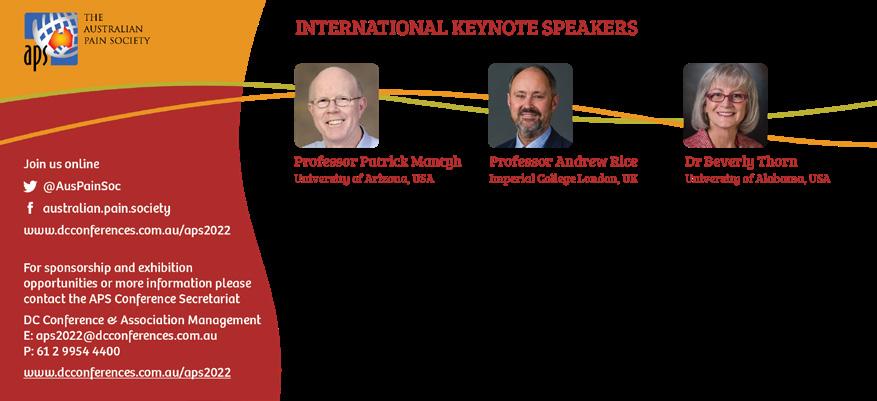


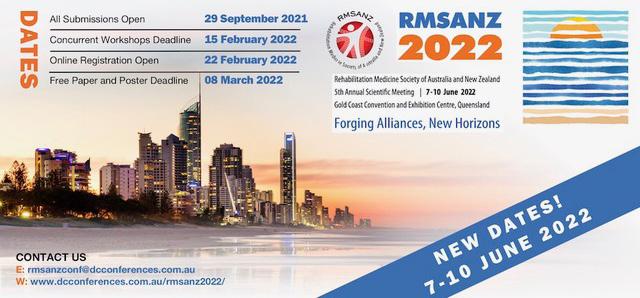
• Pelvic Pain Education Program: https://www.pelvicpaineducation.com/
Other items of interest for our members:
• Latest opioid data from the Australian Bureau of Statistics: Opioid induced deaths in Australia. https://www.abs.gov.au/articles/opioid-induced-deaths-australia
• Australia’s annual overdose report 2019 from the Pennington institute: http://www.penington.org. au/australias-annual-overdose-report-2019/
• The Third Australian Atlas of Healthcare Variation: This series explores how healthcare use in Australia varies depending on where people live. It investigates reasons for variation that may be unwarranted, and provides specific achievable actions to reduce unwarranted variation https://www.safetyandquality.gov.au/atlas
• Painaustralia eNewsletter latest issue, available online at http://www.painaustralia.org.au/media/ enews
• ePPOC: electronic Persistent Pain Outcomes Collaboration: The electronic Persistent Pain Outcomes Collaboration (ePPOC) is an Australasian initiative that aims to improve the quality of care and outcomes for people who experience chronic pain. For more information about ePPOC, refer to the website: http://ahsri.uow.edu.au/eppoc/index.html
• PainHEALTH website: painHEALTH‘s aim is to help health consumers with musculoskeletal pain access reliable, evidence-based information and tips to assist in the co-management of musculoskeletal pain. painHEALTH is an initiative of the Department of Health, Western Australia. http://painhealth.csse.uwa.edu.au/
• Stanford University: CHOIR Collaborative Health Outcomes Information Registry https://choir. stanford.edu/
• Opioid Podcasts for GPs: These podcasts are produced by David Outridge GP, and FAChAM Trainee as a project under the auspices of Dr Steven Kelly Staff Specialist in Addiction Medicine, Kullaroo Clinic Gosford. A 20 week series from the Hunter Postgraduate Medical Institute (University of Newcastle): http://www.gptraining.com.au/recent-podcasts
• Airing Pain: Pain resources via an online radio show produced by Pain Concern, a UK registered Charity: http://painconcern.org.uk/airing-pain/
• Digital Health Guide: Developed by Primary Health Network Tasmania, check out the pain resources by accessing the link https://digitalhealthguide.com.au/Account/ LogOn?ReturnUrl=%2fSpecialtyFormulary%2f2 At login, Username: connectingcare, Password: health
• Indigenous Resources: New webpage on the APS website aggregating Indigenous resources: https://www.apsoc.org.au/Indigenous-Resources
NPS MedicineWise resources:
• Choosing Wisely Australia – News & media: https://www.choosingwisely.org.au/news-events/mediareleases/choosing-wisely-resource-addresses-patient-opioid-knowledge-gap
• Over the counter codeine – changes to supply: https://www.nps.org.au/medical-info/clinical-topics/ over-the-counter-codeine-changes-to-supply
• Medicines with codeine – what you need to know: https://www.nps.org.au/consumers/medicineswith-codeine-what-you-need-to-know
• Information about opioids and chronic non-cancer pain: U-tube clip (5.39mins) https://www.youtube. com/watch?v=8R4RT0pUCf4&feature=share&fbclid=IwAR2dbhzgEAcc7B-ogq2a6Xhud5FDkbciPbdJ9 pb94GnQI6pAeifGd1VP-_I
• Opioids: Communications videos: https://www.nps.org.au/opioids-communication-videos
TGA
• Codeine information hub: https://www.tga.gov.au/codeine-info-hub
NSW Agency for Clinical Innovation resources:
• Brainman and Pain Tool Kit translations, SEP15: http://www.aci.health.nsw.gov.au/chronic-pain/ translated-resources
• Pain Management Resources: http://www.aci.health.nsw.gov.au/resources/pain-management
• Quicksteps to Manage Chronic Pain in Primary Care: http://www.aci.health.nsw.gov.au/chronic-pain/ health-professionals/quick-steps-to-manage-chronic-pain-in-primary-care
– Built into Quicksteps: “How to de-prescribe and wean opioids in general practice”: http://www.aci. health.nsw.gov.au/chronic-pain/health-professionals/quick-steps-to-manage-chronic-pain-inprimary-care/how_to_de-prescribe_and_wean_opioids_in_general_practice
• A list of helpful apps for consumers and clinicians now available at: http://www.aci.health.nsw.gov. au/chronic-pain/health-professionals/management-of-chronic-pain
• Chronic Pain in the ED: https://aci.health.nsw.gov.au/networks/eci/clinical/clinical-tools/painmanagement/chronic-pain-in-the-ed
Deputy Director of Anaesthesia (Pain Management)
The Princess Alexandra Hospital, Brisbane QLD
Job Reference: PA07381828
Employment Status: Permanent Full Time / Part time negotiable
Contact: Dr Martin Wakefield
Applications Close: 24 November 2021
An opportunity exists for a permanent full -time position as Deputy Director of Anaesthesia (Pain Management) at The Princess Alexandra Hospital, Brisbane QLD.
The purpose of the role is to provide clinical care and manage the multidisciplinary care team to provide appropriate anaesthetic and pain management care. You will provide training, education, research, and supervision to junior medical staff and be involved in clinical research. You would work as a Specialist within the Department of Anaesthesia and provide anaesthesia related services in (but not limited to) preadmission clinic, the Endoscopy Unit, Cardiac Catheter laboratories, Radiology and Operating Theatres.
Your role will involve leadership, will collaborate with clinicians to provide clinical pain management care, provide education and teaching, develop a Pain and Regional analgesia Provisional Fellow Program and work within ANZCA guidelines in Anaesthetic and perioperative care.
Applicants key qualification requirement is FANZCA with FFPMANZCA highly desirable
For more information please contact:
Dr Martin Wakefield, Director of Anaesthesia
Ph (07) 3176 2822
Email: Martin.Wakefield@health.qld.gov.au
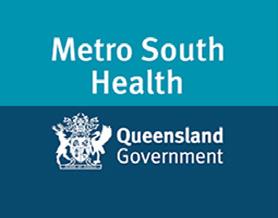
Renewal notices for 2022 will be sent by email to members in late November.
Thank you for your continued support and membership of the APS.
Please note:
1. We understand that circumstances change, so each year we ask you to select your appropriate level of membership.
2. This system of self-reporting subscription levels was implemented in 2009 for the benefit and fairness of all members.
a. Regular A $110
b. Regular B $205
c. Regular C $310
d. Retired $65 Concessional Rate
e. Student $65 Concessional Rate
Before renewing, please ensure you review and update your member profile online.
Payments can be made by Credit Card, BPAY, or Cheque.
Did you know that the Australian Pain Society is a registered charity with ACNC? Your donation will help the Society to promote the prevention and control of diseases in human beings associated with pain.
All donations of $2 or more to APS are tax-deductible.
Ms Susan Campfield Nursing
Mr Ben Douglas Physiotherapy
Ms Zhiqi Liang Physiotherapy
Ms Suzanne Lim Physiotherapy
Dr Carol Wang Acupuncture
Mr Kevin Wernli Physiotherapy
These dates and events are current at the time of publication. Due to the current health concerns with COVID-19, we recommend you make your own enquiries before planning to attend
12-13 November 2021
Australian and New Zealand Association of Oral & Maxillofacial Surgeons
ANZAOMS 2021 Conference
Hotel Grand Chancellor, Hobart, Tasmania
https://www.anzaomsconference.com.au/
20-21 November 2021
Australia New Zealand Headache Society
ANZHS Annual Scientific Meeting
Online, Virtual, Online Conference
https://anzheadachesociety.org/event/anzhsannual-scientific-meeting-part-2/
26 - 28 November 2021
Spine Society of Australia
32nd Annual Scientific Meeting
Online, Virtual, Online Conference
https://dcconferences.eventsair.com/ssa-2021/
24 - 27 March 2022
IASP Pain in Childhood SIG
ISPP 2022 13th International Symposium on Pediatric Pain: Diversity, Equity, Access Online, Virtual, Online Conference
https://www.ispp2022.nz/website/17292/
24- 26 March 2022
New Zealand Pain Society Annual Scientific Meeting
All Hands on Deck
Cordis Hotel, Auckland, New Zealand
https://www.nzps2022.nz/website/24660/
31 March - 2 April 2022
Australian Physiotherapy Association Thrive Conference
Brisbane Convention and Exhibition Centre, Brisbane, QLD
https://australian.physio/pd/conferences
10 - 13 April 2022
Australian Pain Society 42nd Annual Scientific Meeting
In the IASP Global Year for Translating Pain Knowledge to Practice
Hotel Grand Chancellor, Hobart, Tasmania
https://www.dcconferences.com.au/aps2022/
27 - 30 April 2022
European Pain Federation
12th Congress of the European Pain Federation EFIC Convention Centre Dublin, Ireland
https://efic-congress.org/
20 - 22 May 2022
Australian Psychological Society College of Clinical Psychologists
Complexity in Practice - 2021 Annual Conference
Sofitel Brisbane Central, Brisbane, QLD
https://www.psychology.org.au/APS-CCLINConf/2021
30 May - 1 June 2022
National Rural Health Alliance
16th National Rural Health Conference
Bridging social distance; Rural health
innovating & collaborating
Perth Convention Centre, Perth, WA
https://www.ruralhealth.org.au/16nrhc/
7 - 10 June 2022
Rehabilitation Medicine Society of Australia and New Zealand (RMSANZ)
5th Annual Scientific Meeting: Forging Alliances, New Horizons
Gold Coast Convention and Exhibition Centre, Gold Coast, QLD
https://www.dcconferences.com.au/rmsanz2022/
Vision:
All people will have optimal access to pain prevention and management throughout their life.
Mission:
The Australian Pain Society is a multidisciplinary association whose mission is to advance pain prevention, management and clinical practice.
Priorities:
In order to achieve our mission, the Australian Pain Society will provide:
• Education
• Advocacy
• Research
• Services and resources
• Membership
• Good governance and operations
President:
Ms Trudy Maunsell
Acute Pain Service
Princess Alexandra Hospital
Woolloongabba QLD 4102
Tel: 07 3176 5547 Fax: 07 3176 5102
President-Elect:
Mrs Joyce McSwan
Gold Coast Primary Health Network
Persistent Pain Program, QLD and PainWISE
Tel: 0412 327 795 Fax: 07 3539 9801
Secretary:
Mrs Dinah Spratt
Physiotas Physiotherapy
Shearwater TAS 7307
Tel: 03 6428 7500 Fax: 03 6424 7811
Treasurer
Mr Tim Austin
Camperdown Physiotherapy
Newtown NSW 2042
Tel: 02 9517 1787 Fax: 02 9516 2491
ACT Director:
Dr Andrew Watson


Calvary Hospital
Canberra ACT 2617
Tel: 02 6201 6352
NSW Director:
Dr Tim Ho

Inner West Pain Centre
RPA Medical Centre
Newtown NSW 2042
Tel: 02 9517 1764 Fax: 02 9517 1832
NT Director:
Dr Rav Harish
Alice Springs Hospital
Central Australian Health Service
Alice Springs NT 0871
Email: rav.harish@nt.gov.au

QLD Director:

Mrs Karalyn Huxhagen
KH Pharmacy Consulting
Mackay QLD 4740
Tel: 0418 185 972 Fax: 07 4805 6155
SA Director:
Dr Michelle Harris

Royal Adelaide Hospital and Lyell McEwin Hospital
Adelaide SA
Email: michelle.harris2@sa.gov.au
TAS Director:
Ms Bernadette Smith
Psychology Plus
South Burnie TAS
Tel: 03 6431 9959 Fax: 03 6431 9950
VIC Director:
Dr Laura Prendergast Pain Service, Austin Health






Heidelberg VIC 3084
WA Director:
Ms Jacintha Bell
Lifeworks Occupational Therapy
Subiaco WA 6008
Tel: 0451 178 880 Fax: 08 6323 3329
Immediate Past President:
A/Prof Anne Burke
Central Adelaide Local Health Network
Royal Adelaide Hospital
Adelaide SA 5000
Tel: 08 7074 2835 Fax: 08 7074 6247
SPC Chair:
A/Prof Kevin Keay



Department of Anatomy
University of Sydney
Sydney NSW 2006
Tel: 02 9351 4132 Fax: 02 9351 2817
IASP Liaison: Professor Michele Sterling



Recovery Injury Research Centre
University of Queensland
Herston QLD 4029
Tel: 07 3346 4793
Communications Coordinator:
Ms Trudy Maunsell
Acute Pain Service
Princess Alexandra Hospital
Woolloongabba QLD 4102
Tel: 07 3176 5547 Fax: 07 3176 5102
Newsletter Editor:
Dr Lincoln Tracy
School of Public Health and Preventive Medicine
Monash University
Melbourne VIC 3004
Tel: 03 9903 0288
Newsletter Assistant Editor:
Dr Joanne Harmon

School of Clinical and Health Sciences
University of South Australia
Adelaide SA 5000
Tel: 08 8302 1442
PhD Scholarship Chair:
A/Prof Michael Farrell
Retired
VIC
Secretariat:
DC Conference & Association
Management Pty Ltd
PO Box 637
North Sydney, NSW 2059
Tel: 02 9016 4343
Email: aps@apsoc.org.au
Website: apsoc.org.au